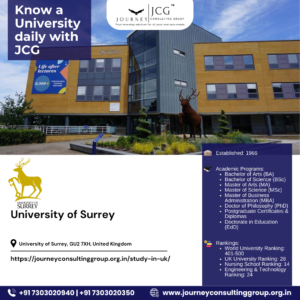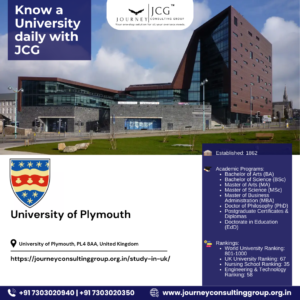Know Your University Series: Stanford university
At Journey Consulting Group (JCG), we believe that the right education is the foundation of success, especially in fields as impactful as medicine. In our Know Your University series, we highlight the world’s leading institutions that are shaping the future of healthcare. Today, we’re focusing on one of the most prestigious medical schools globally—Stanford University School of Medicine.
About Stanford University School of Medicine
Founded in 1908, Stanford Medicine is a globally recognized institution that combines cutting-edge research, world-class education, and exceptional clinical care. Located in the heart of Silicon Valley, California, Stanford’s School of Medicine offers a dynamic environment where innovation meets tradition, making it a top choice for aspiring medical professionals worldwide.

Stanford Medicine’s Legacy of Excellence
Stanford University School of Medicine is part of Stanford University, one of the top-ranked universities globally, and is committed to advancing the frontiers of medicine. It’s renowned for its pioneering research, exceptional teaching faculty, and transformative impact on healthcare.
With an impressive number of Nobel Laureates, Fields Medalists, and Lasker Award winners among its faculty and alumni, Stanford continues to push the boundaries of medical science. From groundbreaking work in cancer research and regenerative medicine to innovations in precision health, Stanford is at the forefront of medical advancements that are changing lives worldwide.
Key Highlights of Stanford University School of Medicine
World-Class Education
Stanford offers one of the most comprehensive and innovative medical education programs in the world. The school’s curriculum is designed to provide students with a solid foundation in the core principles of medicine while integrating the latest advancements in medical science and healthcare technology. The education model emphasizes:
- Patient-Centered Learning: Students are trained to think critically and compassionately, integrating their clinical skills with an understanding of patients’ needs.
- Interdisciplinary Approach: The curriculum encourages collaboration across disciplines, preparing students to be leaders in a rapidly changing healthcare landscape.
- Innovative Learning Methods: With state-of-the-art teaching tools and interactive methods, Stanford ensures that students gain both theoretical knowledge and practical experience.
Research Opportunities
Stanford Medicine is a leader in medical research, offering students the opportunity to engage in some of the most innovative projects in biomedical science. The school’s cutting-edge research facilities and strong collaborations with local biotech companies in Silicon Valley provide students with invaluable opportunities to contribute to groundbreaking work in fields such as:
- Stem Cell Research
- Cancer Immunotherapy
- Neuroscience and Neurosurgery
- Gene Therapy and CRISPR Technology
Research initiatives at Stanford’s Stanford Health Care and Lucile Packard Children’s Hospital continue to shape the future of medicine. The university is home to Stanford Bio-X, an interdisciplinary initiative that combines biology, physics, engineering, and other sciences to accelerate medical discoveries.
Affiliated Hospitals and Clinical Training
Stanford University School of Medicine’s affiliation with Stanford Health Care and Lucile Packard Children’s Hospital gives students access to some of the best clinical training opportunities in the world. These hospitals serve as real-world laboratories where medical students practice patient care, research, and engage with cutting-edge treatments in fields such as oncology, cardiology, neurology, and pediatrics.
Stanford’s proximity to the vibrant Silicon Valley ecosystem also offers students access to emerging technologies and innovations in medical devices, healthcare IT, and biotechnology.
Global Health and Medical Innovation
Stanford Medicine is committed to improving healthcare outcomes globally, addressing both local and international health challenges. Some of the initiatives include:
- Global Health Fellowships: Stanford provides medical students with opportunities to work on global health projects in low-income countries, tackling public health issues like infectious diseases, nutrition, and maternal health.
- Medical Innovation: Stanford leads the charge in creating next-generation medical technologies, from robotic surgeries to artificial intelligence in diagnostics. The institution encourages students to think creatively about solving some of the world’s most pressing health problems.
Admissions Process at Stanford University School of Medicine
Admission to Stanford Medical School is highly competitive, with a rigorous process designed to identify exceptional candidates who are passionate about making a difference in the world of medicine. The typical requirements for Stanford Medicine include:
- Bachelor’s Degree: Applicants must have a solid academic foundation, with a focus on sciences such as biology, chemistry, and physics.
- MCAT Scores: Strong MCAT scores are essential to demonstrate academic potential.
- Clinical Experience: Previous clinical experience, whether through internships, volunteer work, or research, is highly valued.
- Letters of Recommendation: Applicants should submit letters of recommendation from professors, physicians, or mentors who can speak to their academic abilities, clinical experiences, and potential in medicine.
- Personal Statement: Applicants must submit a compelling personal statement detailing their motivations for pursuing a career in medicine, their experiences, and their long-term goals in healthcare.
Stanford University values diversity and inclusion, ensuring that talented students from all backgrounds have the opportunity to contribute to its mission of advancing medical education, research, and care.
Why Choose Stanford University School of Medicine?
Stanford University School of Medicine offers an unmatched combination of academic excellence, groundbreaking research, and clinical expertise. Here are some reasons why it’s the ideal choice for aspiring medical professionals:
- Prestigious Reputation: Stanford is consistently ranked among the top medical schools globally, with a reputation for excellence in both research and clinical care.
- Opportunities for Advancement: With an expansive global alumni network, graduates of Stanford Medicine enjoy access to a wealth of career opportunities in academia, clinical practice, healthcare policy, and research.
- Innovative Education: Stanford offers an innovative, patient-centered approach to medical education, preparing students to be leaders in medical science and practice.
- Global Impact: The university’s focus on global health and technological innovation means students can make a profound impact on health outcomes worldwide.
Conclusion
Choosing the right medical school is a pivotal decision for any aspiring doctor. Stanford University School of Medicine’s commitment to academic rigor, groundbreaking research, and global healthcare innovation makes it a top choice for students who want to make a difference in the world of medicine.
At Journey Consulting Group (JCG), we’re here to help you navigate the admissions process, secure housing, and ensure your transition to Stanford is as seamless as possible. Whether you’re applying to Stanford or another top university, we provide comprehensive support to help you succeed.








